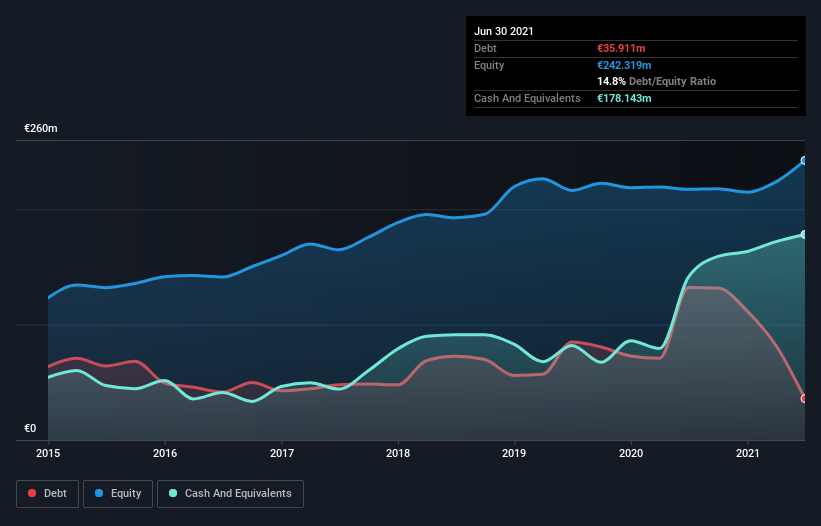Warren Buffett famously said, 'Volatility is far from synonymous with risk.' So it seems the smart money knows that debt - which is usually involved in bankruptcies - is a very important factor, when you assess how risky a company is. We note that Biesse S.p.A. (BIT:BSS) does have debt on its balance sheet. But the real question is whether this debt is making the company risky.
When Is Debt Dangerous?
Generally speaking, debt only becomes a real problem when a company can't easily pay it off, either by raising capital or with its own cash flow. If things get really bad, the lenders can take control of the business. However, a more usual (but still expensive) situation is where a company must dilute shareholders at a cheap share price simply to get debt under control. Of course, the upside of debt is that it often represents cheap capital, especially when it replaces dilution in a company with the ability to reinvest at high rates of return. The first thing to do when considering how much debt a business uses is to look at its cash and debt together.
See our latest analysis for Biesse
How Much Debt Does Biesse Carry?
As you can see below, Biesse had €35.9m of debt at June 2021, down from €132.1m a year prior. However, its balance sheet shows it holds €178.1m in cash, so it actually has €142.2m net cash.

A Look At Biesse's Liabilities
The latest balance sheet data shows that Biesse had liabilities of €381.7m due within a year, and liabilities of €40.7m falling due after that. On the other hand, it had cash of €178.1m and €119.3m worth of receivables due within a year. So its liabilities outweigh the sum of its cash and (near-term) receivables by €125.0m.
Of course, Biesse has a market capitalization of €734.7m, so these liabilities are probably manageable. But there are sufficient liabilities that we would certainly recommend shareholders continue to monitor the balance sheet, going forward. Despite its noteworthy liabilities, Biesse boasts net cash, so it's fair to say it does not have a heavy debt load!
On top of that, Biesse grew its EBIT by 72% over the last twelve months, and that growth will make it easier to handle its debt. There's no doubt that we learn most about debt from the balance sheet. But ultimately the future profitability of the business will decide if Biesse can strengthen its balance sheet over time. So if you want to see what the professionals think, you might find this free report on analyst profit forecasts to be interesting.
Finally, while the tax-man may adore accounting profits, lenders only accept cold hard cash. While Biesse has net cash on its balance sheet, it's still worth taking a look at its ability to convert earnings before interest and tax (EBIT) to free cash flow, to help us understand how quickly it is building (or eroding) that cash balance. Happily for any shareholders, Biesse actually produced more free cash flow than EBIT over the last three years. There's nothing better than incoming cash when it comes to staying in your lenders' good graces.
Summing up
While Biesse does have more liabilities than liquid assets, it also has net cash of €142.2m. And it impressed us with free cash flow of €118m, being 150% of its EBIT. So we don't think Biesse's use of debt is risky. The balance sheet is clearly the area to focus on when you are analysing debt. However, not all investment risk resides within the balance sheet - far from it. To that end, you should be aware of the 1 warning sign we've spotted with Biesse .
At the end of the day, it's often better to focus on companies that are free from net debt. You can access our special list of such companies (all with a track record of profit growth). It's free.
Valuation is complex, but we're here to simplify it.
Discover if Biesse might be undervalued or overvalued with our detailed analysis, featuring fair value estimates, potential risks, dividends, insider trades, and its financial condition.
Access Free AnalysisThis article by Simply Wall St is general in nature. We provide commentary based on historical data and analyst forecasts only using an unbiased methodology and our articles are not intended to be financial advice. It does not constitute a recommendation to buy or sell any stock, and does not take account of your objectives, or your financial situation. We aim to bring you long-term focused analysis driven by fundamental data. Note that our analysis may not factor in the latest price-sensitive company announcements or qualitative material. Simply Wall St has no position in any stocks mentioned.
Have feedback on this article? Concerned about the content? Get in touch with us directly. Alternatively, email editorial-team (at) simplywallst.com.
About BIT:BSS
Biesse
Manufactures and sells integrated lines and machines for the processing of wood, glass, stone, plastics, and composites in Western Europe, the Asia-Pacific, Eastern Europe, North America, and internationally.
Adequate balance sheet and fair value.
Market Insights
Community Narratives



